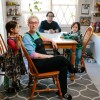Pavel Bondarchuk, 49

Pavel Bondarchuk
Age: 49
Irvine
Tuesday, March 8, 2022
I was born in Vorkuta, Komi Republic. It's a polar part of Russia. It's an area of very infamous Gulag camps [Soviet labor camps that detained political prisoners of the Soviet Union]. My grandfather served a 10-year term there: eight years in a camp, and then two in Vorkuta, at the coal mine. When I was six years old, we moved to Leningrad area, St. Petersburg area, where I grew up, finished school, and then studied at the St. Petersburg Institute of Technology.
The first time I came to the United States was in 1998 for a business trip. The next year, after Russia’s default, I got an invitation from my company and we moved to Orange County. I was 25 at the time and have lived here about half my life.
I have relatives in Ukraine, mostly in the eastern part, and I have relatives in Russia. I would call our family Russian-Ukrainian. My mother loved to sing Ukrainian songs; I grew up reading Ukrainian books, watching Ukrainian cartoons and visiting my grandparents in Ukraine every summer. My first language is Russian but my Ukrainian has improved over the past 10 years because I’ve spent a lot of time there for work. I work for a software company and we have most of our developers in Ukraine.
I’m angry. I’ve never been so angry in my life. These events have finally made me make a very important decision about what is evil and what is not. Before, I tried to be as tolerant as possible towards Russia. I really liked St. Petersburg. I love my country. Sometime in the future it will be a great country. I was so proud of Russia’s success in the early 2000s. But I started seeing that things are going wrong, maybe a little bit later than many people. I have friends who immediately after Putin came to power said, “Okay, nothing good will happen anymore. We have a KGB agent in the government.”
I think the time has come for collective guilt for the Russian people. I am a Russian. Even though I'm half Ukrainian, I think I'm guilty as well, because I probably did not spend enough time talking to my friends and family back in Russia; I didn't voice my opinion in stronger terms. Now, the country is committing war crimes.
Even if Russia withdraws right now, I would like to see the sanctions continue for two, three years. So people in Russia will understand that all their wealth that they enjoyed in the last years actually happened because they were part of the world economy. I want them to understand their position in the world.
I have no mercy for Russia. I'm not going to until I see some actions, civil actions, protest, whatever it takes. If everybody goes to the streets, I think this regime will collapse. The Russian oppression machine cannot work with such a huge crowd. We saw this in Moscow in 1991 [when protestors rallied against the preservation of the USSR]. And we could see it again.
Unfortunately, right now you get 15 years in prison for saying something. It's scary to go outside knowing that you can get such a harsh sentence. But what else you can do? People must speak up. The next thing you know, they could just start taking people from their apartments for no reason, which is most likely what happened with my grandfather. So either people sit and wait, or they do something.













